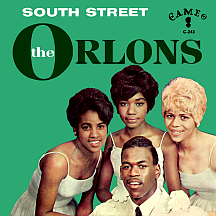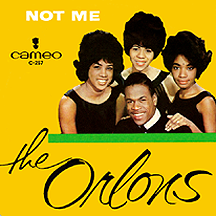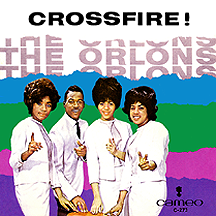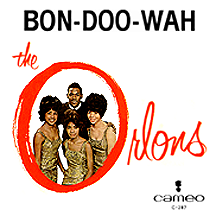THE ORLONS
Audrey and the Teenettes dreamed of having a music career like rock's trailblazing late-1950s girl groups The Chantels, The Shirelles and others. In every high school there seemed to be at least one tightly-knit clique with similar goals and enough talent and drive to take a shot at it. Audrey Brickley and her sisters Shirley and Jean, along with Marlena Davis and Rosetta Hightower, all around 14 years old in 1960, formed a vocal quintet while attending Philadelphia's Overbrook High School. Their ages presented a problem early on, and the Brickley girls' mother didn't approve of the kinds of clubs and adult hangouts where they might be performing, insisting Audrey and Jean give it up (though slightly-older sister Shirley continued).
The Romeos were a male vocal group at Overbrook that featured lead singer Stephen Caldwell. The girls, in search of at least one more member and (due to Audrey's departure) a new name, asked Steve, a couple of years older than them, to join - and what red-blooded young guy could turn down any request from three girls? Inspiration for the name came from another male singing outfit at the school, The Cashmeres (not the same act who had a hit that year with "Satisfied"), so they countered with The Orlons (probably neglecting to take into consideration that cashmere is a type of real wool, while orlon is a synthetic fiber - a comparison could be drawn that one is real and the other is not).
Names aside, having a male singer in the group set The Orlons apart. That uniqueness was to be a key to their success. Turns out the Cashmeres were the guys who later became The Dovells (so maybe the cashmere/orlon comparison wasn't so far-fetched). Their lead singer Len Barry became friends with the school's up-and-coming three-girls-and-a-guy, suggesting they audition (just as his group had) for Philly's hottest record company, Cameo-Parkway. The label's execs didn't bite at first, but after a few attempts they were signed and placed on the Cameo label. The gimmick of having one male backup singer in a girl group helped turn the trick, and writer/producer Dave Appell took charge of their development. Appell resisted the temptation to use Caldwell as lead singer, instead giving each of the girls a shot at lead duties, starting with Marlena Davis on the first single "I'll Be True" and Shirley Brickley on "(Happy Birthday) Mr. Twenty-One," the follow-up. Nice efforts, but neither got off the ground and the four were assigned backing vocal duties on two songs that became big hits for Cameo's Dee Dee Sharp: "Mashed Potato Time" and "Gravy."
It was Rosetta Hightower who took advantage of life's third-time's-a-charm rule, although her dynamic vocal ability likely had more to do with the success of the next single, "The Wah-Watusi." Based on the 1961 hit by The Vibrations, "The Watusi," a dance designed for individuals as opposed to dancing partners, the group's 1962 release became one of several '60s songs that borrowed the name of the African tribespeople from Rwanda (including Ray Barretto's 1963 spanish-language "El Watusi," which was not about the dance). But the Orlons dominated the Watusi world, reaching number one on many radio station playlists across the U.S. and number two on the national charts.
With a smash single (one of the year's biggest) to their credit, the formula was set: uptempo, danceable tunes written in most cases by Kal Mann and Dave Appell, with Hightower on lead vocal and Caldwell interjecting a clever "hook" line a few times in each song. During the recording of the next single, Steve developed a frog in his throat, no more than a random mistake during a take of the song, but the producers asked him to perform the finished master in that voice, akin to bringing in Popeye the Sailor of Max Fleischer cartoon fame to do backup vocals. The song, "Don't Hang Up," was a gem, nearly as big as the previous hit, sealing Caldwell's fate on successive releases.
Next came "South Street" in early '63, about an actual street where teenagers would frequently hang out, located near the Port of Philadelphia at the Delaware River separating Philadelphia from Camden, New Jersey. It was the third smash in a row for the group. The specificity of the location didn't hinder the record's progress as it became a hit from coast to coast. Interestingly, Mann and Appell fashioned the song after Stephen Foster's 1850 composition "Camptown Races" with its 'doo dah, doo dah' refrain. Right about that time the act appeared on the Pageant label with "Where You Goin', Little Boy?" under a different name, Zip and the Zippers. Caldwell sang lead in both his normal and more familiar frog voice on what is essentially a one-off novelty disc.
"Not Me," initially a lesser vehicle for Gary (U.S.) Bonds in 1961, was the next Orlons hit, followed by "Crossfire!" (sung rapid-fire in a way that my mother once said she thought the title was "Horsefly!"), another great record, making it five big hits in a row. The group's impact waned in late 1963 as the next single, "Bon-Doo-Wah," fell off quickly. Its flip side, the Billy Jackson-Jimmy Wisner composition "Don't Throw Your Love Away," had a second life a few months later when a version by British band The Searchers went top 20 in the U.S. and number one in England. Orlons singles began losing a little ground with each release including "Shimmy Shimmy," a surprisingly lukewarm remake of Bobby Freeman's 1960 hit "(I Do The) Shimmy Shimmy," and "Knock! Knock! (Who's There?)," a fun but unsuccessful merging of Claudine Clark's "Party Lights" dilemma and the popular "knock-knock" jokes of the day.
Cameo-Parkway released them from the label in 1965. Caldwell had already moved on, but the girls forged ahead with original member Audrey Brickley back in the lineup. In '66 and '67 they performed a great deal, including a tour in England, and had singles on the Calla and ABC labels (wrapping with a considerably altered version of former Cameo labelmate Bobby Rydell's first hit, "Kissin' Time"). Rosetta Hightower, the distinctive lead singer on the big hits, opted to stay in the U.K. and worked as a backup singer for Joe Cocker and others. In 1968 they called it quits and remained inactive until Steve Caldwell, frog voice intact, reformed the group with a lineup of varying members including another of the original sisters, Jean Brickley, going on to perform as The Orlons for many years.
NOTABLE SINGLES:
- I'll Be True - 1961
- (Happy Birthday) Mr. Twenty-One - 1962
- The Wah-Watusi - 1962
- Don't Hang Up - 1962
- South Street - 1963
- Where You Goin', Little Boy? - 1963
as Zip and the Zippers - Not Me - 1963
- Crossfire! - 1963
- Bon-Doo-Wah /
Don't Throw Your Love Away - 1963 - Shimmy Shimmy - 1964
- Rules of Love - 1964
- Knock! Knock! (Who's There?) - 1964
- I Ain't Comin' Back - 1965
- Spinnin' Top - 1966
- Keep Your Hands Off My Baby - 1967
- Kissin' Time - 1967





